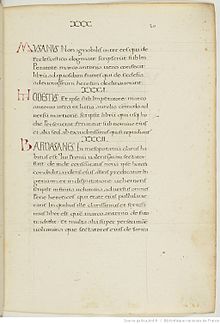
Back الرجال الامعين للقديس جيروم Arabic De Viris Illustribus (San Jerónimo) Spanish Kuuluisia miehiä (Hieronymus) Finnish על אישים מפורסמים (הירונימוס) HE De Viris Illustribus (Hieronimus) ID De viris illustribus (Girolamo) Italian За знаменитите мажи Macedonian Dos Homens Ilustres (Jerônimo) Portuguese О знаменитых мужах (Иероним) Russian O znamenitim ljudima (Hijeronim) Serbo-Croatian
 | |
| Author | Jerome |
|---|---|
| Original title | De viris illustribus |
| Translator | Ernest Cushing Richardson Ernest J. Engler Philip Schaff Thomas P. Halton |
| Language | Latin |
| Genre | Biography, bibliography |
| Published | AD 393 |
| Publication place | Roman Empire (Palaestina Prima) |
| Media type | Manuscript |
| 270.1 | |
| LC Class | BR60.F3 J4713 |
Original text | De viris illustribus at Latin Wikisource |
| Translation | De Viris Illustribus at Wikisource |

De Viris Illustribus (On Illustrious Men) is a collection of short biographies of 135 authors, written in Latin, by the 4th-century Latin Church Father Jerome. He completed this work at Bethlehem in 392–393 AD.[1] The work consists of a prologue plus 135 chapters, each consisting of a brief biography. Jerome himself is the subject of the final chapter. A Greek version of the book, possibly by the same Sophronius who is the subject of Chapter 134, also survives. Many biographies take as their subject figures important in Christian Church history and pay especial attention to their careers as writers. It "was written as an apologetic work to prove that the Church had produced learned men."[2] The book was dedicated to Flavius Lucius Dexter, who served as high chamberlain to Theodosius I and as praetorian prefect to Honorius. Dexter was the son of Saint Pacianus, who is eulogized in the work.[3]
- ^ "This work [De viris illustribus], as he reveals at its start and finish, was completed in the fourteenth year of Theodosius, that is, between 19 January 392 and 18th January 393." A. D. Booth, "The Chronology of Jerome's Early Years", Phoenix 35 (1981), p. 241.
- ^ Louis Saltet, "St. Jerome," Catholic Encyclopedia, New York: 1910.
- ^ "Irondequoit Catholic Communities - - Pacian". Archived from the original on 28 October 2007. Retrieved 30 October 2007.
© MMXXIII Rich X Search. We shall prevail. All rights reserved. Rich X Search